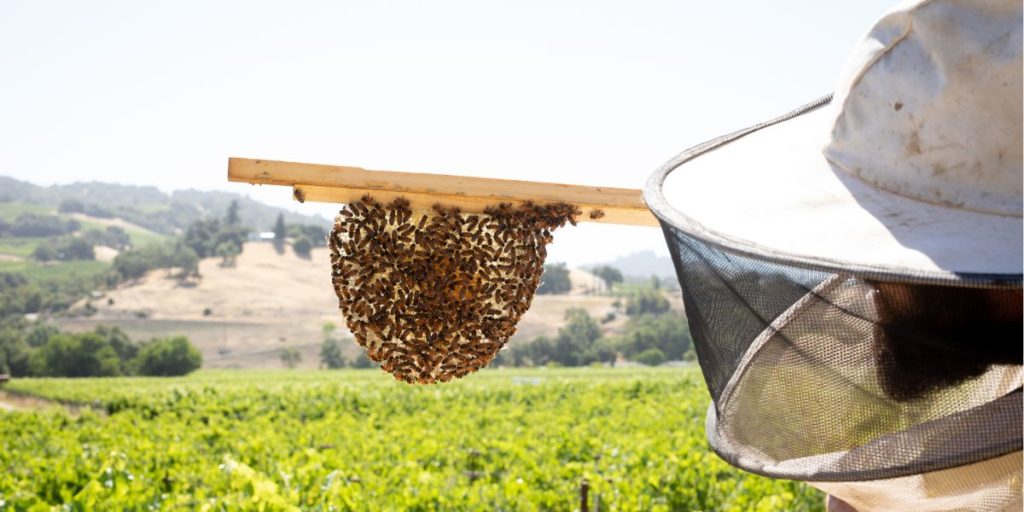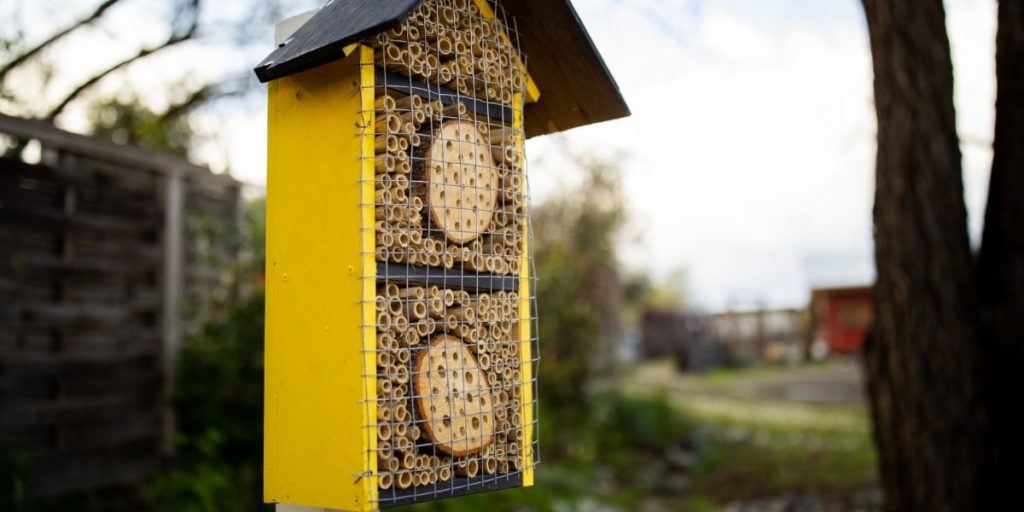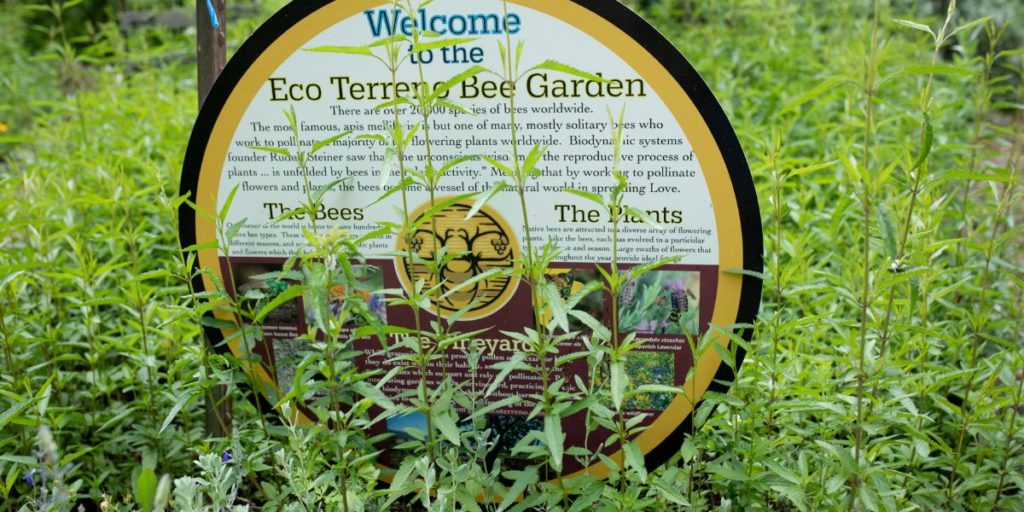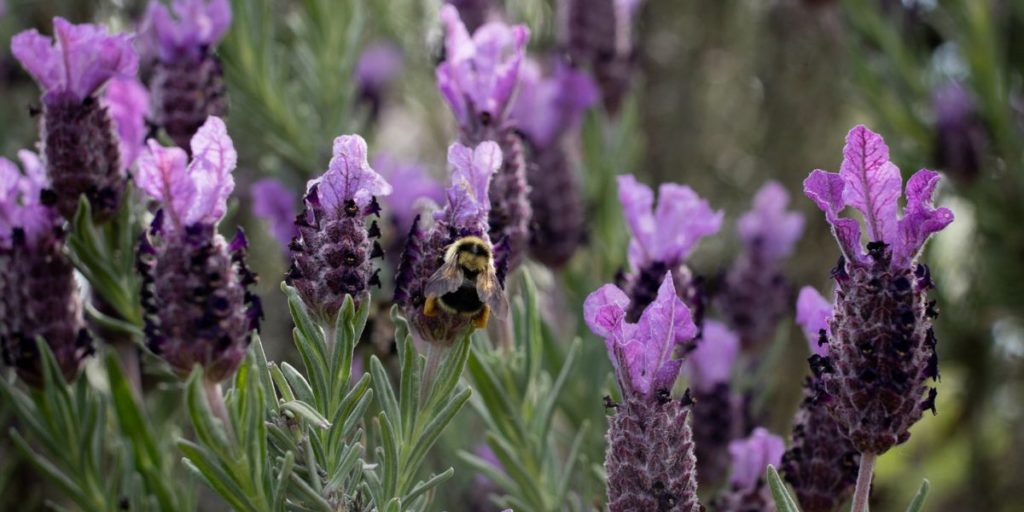Farm health: The importance of bees in our vineyard
Bees are our heroes at Eco Terreno. We honor their value to the earth so much that our logo features a bee. But what do bees have to do with great winemaking? Everything … and more.
The importance of bees on all ecosystems
With their loopy flight and busy flower visits, bees aren’t just cute and fun to watch. They’re critical to a healthy, balanced ecosystem. It’s well known that a thriving bee population is directly related to the health and vitality of the world’s natural food sources—i.e. plants and animals that rely on those plants to survive.

The roles of bees in the vineyard
Bees don’t pollinate our grapevines, but they do pollinate our vineyard cover crops. With their help we conserve water, avoid monocultural farming, create more nutrient-rich soil, and maintain our sustainable, regenerative farming practices.
Additionally, the presence of bees creates an environment welcoming to beneficial insect predators who happily settle into the cover crops. These insect predators don’t bother the vines, but they do consume vineyard pests.
Bees also pollinate our fruit and olive orchards and edible gardens, allowing us to grow delicious produce our team of people and animals enjoy seasonally.
Saving bees by protecting their environment
Bees are in great decline globally. It’s a serious problem that can only be solved by us all contributing to their well-being, whether as an individual or as a business like ours. Being an agricultural business, we have a major role to play. We take it seriously by creating environments that are chemical-free and abounding with pollen and nectar-rich flora. In fact, we’re so committed, we are a certified bee-friendly farm!
Our bee-friendly ecosystem starts by protecting our natural habitat for native bees. For the ground-dwelling bees we maintain native bunch grasses. For the burrowing bees, we preserve the hollow pithy stems of plants as well as tree trunks and stumps.

We’ve also added beehive boxes around the farm. You’ll find four in our Lyon Vineyard and four in our Cisne; they’re popular with European honeybees. Our Edible Garden is home to three more boxes plus all kinds of bee-friendly plants. Not only do we provide these boxes as homes, but we also regularly check for the presence of diseases and pests. If support is needed, we use only holistic tools and remedies to nurse them back to health.
At the heart of our bee-friendly environment is the Bee Garden. It’s designed from top to bottom as a haven for native bumblebees and carpenter bees. Not surprisingly, the bees aren’t the only ones who love our flowers, which are free from pesticides and other harmful chemicals. Butterflies, dragonflies, birds find much to eat and love in our garden.

We want to bee the change
If you stroll our grounds, you’d find they’re literally abuzz with happy bee life. Their presence is a great indication of a healthy ecosystem, and it’s our hope that our contribution to a vital natural environment will perpetuate outward from our farm and into our community at large.
How to grow a bee-friendly garden
Tips for a garden that will keep bees happy and well fed.
- Grow plants that flower right through the year
- Many bee species need nectar all year round. To keep the nectar flowing, find plants with a long flowering season, or plants that flower each season. Put these on your list – English Lavender, Shasta Daisy, Russian Sage, and if you want a splash of yellow in your garden, try the Coreopsis.
- Select a variety of colors and shapes
- Bees have preferences too. Some have short tongues making shallow flowers like daisies their flower of choice. Some have long tongues, preferring tubular flowers such as rosemary. And some choose based on color, liking the blue or purple flowers of many varieties of Lavender and Salvias.
- Don’t use pesticides or insecticides in your garden
- Bees are extremely sensitive to insecticides. Yes it will kill the garden pests but bees will be harmed unnecessarily too. Instead, encourage natural predators like wasps, ladybugs, lacewings, and praying mantis to your garden to take care of those annoying pests.

